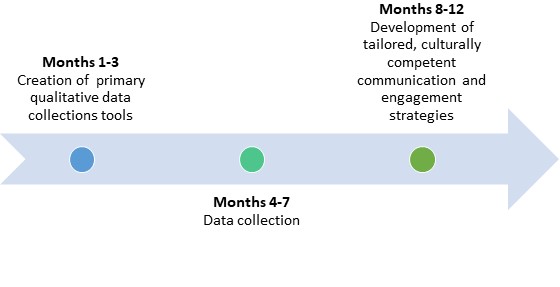3U01FD007982-01 Supplement
OMHHE Racial and Ethnic Minority Acceleration for Health Equity Consortium (REACH) Project:
A. Food Allergy Disparities for Adult Diverse Populations
B. Gene Therapy for Sickle Cell Disease
C. Roundtable Planning and Activities
BACKGROUND
This Supplement to REACH grant 1U01FD007982-01 leverages extensive community partnerships and resources and are consistent with the “Equity in Voices” Pillar for the Consortium, REACH. The Project focuses on three areas: A) Food Allergy in Diverse Adults: needs, unmet needs, and inequities. Strategies to address tailored communication opportunities; B) Sickle Cell Disease and Gene Therapy disparities, communication, and educational strategies: patient, caregiver, and community perspectives.; C) REACH Roundtable Planning and Activities.
A. FOOD ALLERGY DISPARITES: DIVERSE ADULTS
Food allergies (FAs) affect an estimated 8% of children and 11% of adults in the US. Individuals with an FA may experience FA-related economic burden, lower health-related quality of life, and increased risk of comorbid atopic conditions (i.e., eczema, asthma, and/or allergic rhinitis). However, the distribution of FA burden may vary across different racial, ethnic, and socioeconomic strata. Food allergies generally, are important concerns for diverse and rural communities. These communities may experience disparities and inequities in prevalence and access to and affordability of allergen free food, information voids, access issues for injectable epinephrine and other mitigating resources to reduce and control allergen exposure.
B. SICKLE CELL DISEASE (SCD) AND GENE THERAPY
Sickle cell disease (SCD) is a group of inherited blood disorders affecting approximately 100,000 people in the U.S. It is most common in Blacks/African Americans and, while less prevalent, also affects Hispanic Americans, as well as people from Southern European, Middle Eastern, and Asian Indian backgrounds. SCD occurs in about 1 of every 365 Black/African American births and 1 out of every 16,300 Hispanic American births.
Sickle cell disease is caused by a genetic mutation in hemoglobin, a protein in red blood cells that delivers oxygen to the body’s tissues. The mutation causes red blood cells to develop a “sickle” shape. These sickled red blood cells restrict blood flow to vessels and limit oxygen delivery to the body’s tissues, leading to severe pain and organ damage. The recurrence of these events, often referred to as “sickle cell crises,” can lead to life-threatening disabilities and/or early death.
In December of 2023, the U.S. Food and Drug Administration approved two milestone treatments for SCD, Casgevy and Lyfgenia, representing the first cell-based gene therapies for the treatment of sickle cell disease in patients 12 years and older.
To better understand perspectives regarding SCD and gene therapy, the FDA’s REACH Consortium will solicit and identify patient and caregiver perspectives regarding communication needs and preferences, preferred communication channels, and knowledge gaps. The findings from this program will be used to inform the development of educational materials to help people living with SCD better understand gene therapy and help patients and caregivers make informed decisions about their treatment options.
METHODS: This project uses qualitative data collection methods (i.e. key informant interviews, focus groups) to assist the FDA OMHHE in developing and refining communication and engagement strategies for: A) Diverse food allergy adult patients and caregivers; B) Sickle Cell Disease (SCD) and Gene Therapy.; C. Continuation of Roundtable Planning and Activities. Building on existing work, this project will engage Xavier University of Louisiana College of Pharmacy, and Coppin State University College of Health Professions and Nursing, both HBCUs as well as community-based organizations in an exploration of diverse adult food allergy patients and stakeholder needs as well as SCD patients and caregiver perspectives and their unmet needs and to advance tailored, culturally competent communication and engagement strategies for diverse populations.
Timeline: 12 months
TIMELINE AND FUNDING
UMD requests funding to complete the additional outputs within the current scope of work. The budget will be distributed to cover the following:
- Develop primary qualitative data collections methods (that i.e., community assessments, focus groups and/or, interviews etc.) and leverage existing partners in an exploration of diverse food allergy adult patients, caregiver, community, and their unmet needs.
- Support “Sickle Cell Disease (SCD) and Gene Therapy” qualitative data collection to assess community needs, unmet needs and to solicit patient and caregiver preferred communication and educational strategies that will increase FDA understanding of patient and caregiver perspectives. Desired outcomes will answer the question: How do we communicate the range of information on SCD and gene therapy to diverse patients, caregivers, and community.
- Support REACH Roundtable planning and activities.
The estimated timeline, assuming project approval is below:

